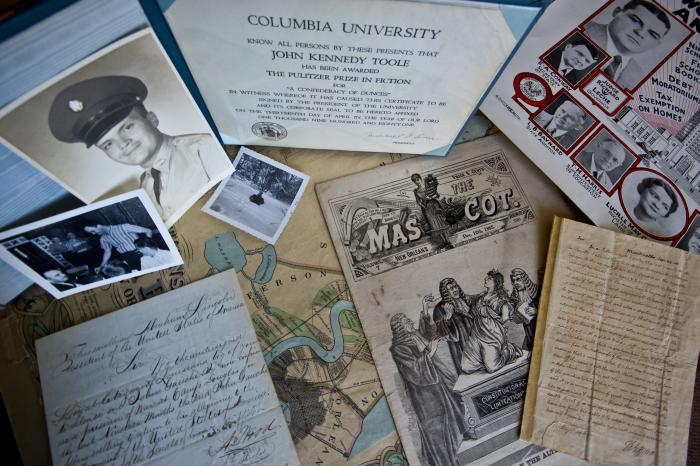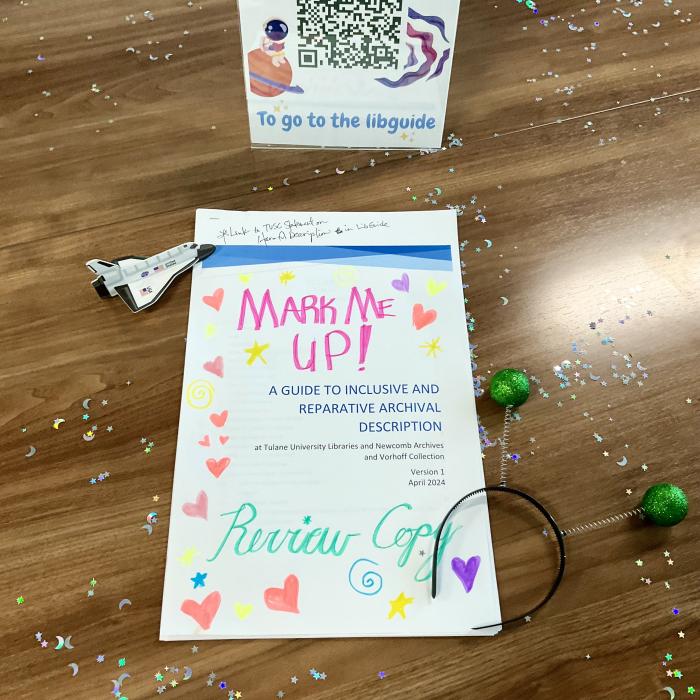You can search, browse, and explore over 2,000 finding aids that describe archival collections held by Tulane University Special Collections (TUSC) via Tulane University's instance of ArchivesSpace.
- All TUSC finding aids
- Hogan Archive finding aids
- Louisiana Research Collection finding aids
- Southeastern Architectural Archive finding aids
- University Archives finding aids
Tulane's ArchivesSpace search tool also enables you to search finding aids for archival collections held by the Newcomb Archives and The Latin American Library. Please consult each repository for more information on access policies, location, and hours.
For an overview of how to understand and use a finding aid in ArchivesSpace, please consult this guide developed by MIT Libraries.

Researchers can access all processed, unrestricted materials held by Tulane University Special Collections. Please see our Visitor Information page for details on how to make an appointment and to review our guidelines for reading room conduct.
Unprocessed Collections
Before an archival collection can be made available to researchers, it goes through a process that may include rehousing into new boxes and folders, arranging it into a logical order, writing a description that helps researchers find materials in the collection, cleaning and conservation when necessary, and other activities. Collections that have not yet been made ready for researchers are considered “unprocessed” and are available only after curatorial review. Access to the unprocessed collection may or may not be granted depending on the collection’s condition. Note that when special permission is granted, it may take several weeks to prepare the collection for use. To request access to an unprocessed collection please contact the relevant curator or email TUSC Research Services at specialcollections@tulane.edu. The curator will consider the request with the following in mind:
- Is the researcher a current Tulane affiliate?
- Is a Tulane administrator requesting access to Tulane University records?
- Is the donor of the materials requesting access?
- Has the researcher used the collection before?
- What is the collection’s condition? Does it require special handling or stabilization prior to handling?
- Does the collection have privacy, copyright, or legal issues?
- Does the collection have format issues, such as containing digital materials, A/V materials, or oversize items such as architectural drawings?
- What is the collection’s size? As a general rule, we will not provide access to larger unprocessed collections unless the request can be narrowed to a specific, manageable portion of the materials.
- Is there an inventory for the collection? Does the collection have numbered boxes, foldered contents, or other systematically identified items?
- Does the curator have special knowledge that can assist with providing access, help the researcher narrow their request, or guide the researcher through navigating the collection?
Audiovisual Materials
All analog audiovisual materials must be reformatted before they can be accessed. Please see our procedures for requesting AV digitization here.
University Records
Some materials in our collections are restricted due to legal requirements or university policy. Records held by Tulane University Archives are governed by the policies found here.
What Is Archival Description?
Archival description is the language used to describe archival material in a finding aid and for digitized archival items. Finding aids and digitized archival material represent the holdings of a repository and are written by archivists or staff while processing or digitizing a collection. The goal of archival description is to document the contents of a collection or a portion of a collection thereby facilitating access. For access to our finding aids, please visit https://archives.tulane.edu/. If you encounter harmful or non-inclusive language in archival description, please fill out this feedback form at the following link: https://airtable.com/apprTCrsONCaWfzsx/shrf0BcjYUKoEiwSF.
Guide to Inclusive and Reparative Archival Description
Tulane University Libraries is pleased to share its Guide to Inclusive and Reparative Archival Description, written by staff at Tulane University Special Collections and Newcomb Archives and Vorhoff Collection. This document provides guidance on applying inclusive and equitable descriptions to archival materials and ensuring that descriptions are accessible to all users. To view the Guide and learn more visit: https://libguides.tulane.edu/inclusive-reparative-guide

Acknowledgment
The staff of Tulane University Special Collections (TUSC) acknowledges that harmful and non-inclusive language can be found in the descriptions of our archival collections. Harmful and non-inclusive language reinforces inequalities between groups and reinforces the power structures that disenfranchise these groups. Harmful description includes terms that may be ableist, ethnocentric, heterocentric, homophobic, racist, or sexist to describe individuals, groups of people, and perspectives. Non-inclusive description can valorize one group or person over another and obscures the lives of those described in the written historical record. Some of this language will be maintained as part of the historical record while other instances of this language will require revision or additional information. See the following examples:
- Information will be maintained in order to retain the historical record.
- For example, original folder titles are an example of language provided by the creator that we maintain in order to preserve the historical record, even if it includes harmful or non-inclusive language.
- Information will be revised if it is harmful or non-inclusive and was written by an archivist in a finding aid or other forms of description.
- For example, identification of a woman by her husband’s name or “and wife” in the caption of a photograph is an example of the type of non-inclusive language that will be updated if we can identify and include the person’s full name.
- Information will be added if a person, group, or subject has been excluded.
- For example, if a collection of personal papers contains material on both a husband and wife but the title includes only the name of one of the male creator, the title will be adjusted to include the preferred name of the female creator.
- Library of Congress Subject Headings (LCSH) can be harmful and non-inclusive. We aim to eliminate the use of harmful and non-inclusive LCSH in our descriptions.
- For example, see the Report of the SAC Working Group on Alternatives to LCSH “Illegal aliens”
Commitment
We align ourselves with TUSC’s Vision, Mission, Values Statement and Society of American Archivists’ Statement of Principles.
To that end, we commit to the following:
- We commit to using non-harmful and inclusive language in our descriptive practices.
- We commit to repairing harmful and non-inclusive language in our archival descriptions.
- We commit to treating archival description as a living organism, and to stay informed about continued development of archival descriptive practices and our own implicit biases and limitations as archivists.
- We commit to creating guiding principles for description that aid in how we approach our current descriptive practices and the repair of harmful and non-inclusive description.
- We commit to being transparent and documenting our method to repairing harmful and non-inclusive archival descriptions.
References and Sources For Further Reading
- Rubenstein Library Technical Services Department Guiding Principles for Description
- Princeton University Library Special Collections Statement on Language in Archival Description
- Temple University Special Collections Research Center Statement on Potentially Harmful Language in Archival Description and Cataloging
- Society of American Archivists, "Statement of Principles," Describing Archives: A Content Standard (DACS)
- Society of American Archivists, Description Section. “Inclusive Description Resources”
- Sunshine State Digital Network Inclusive Metadata & Conscious Editing Resources